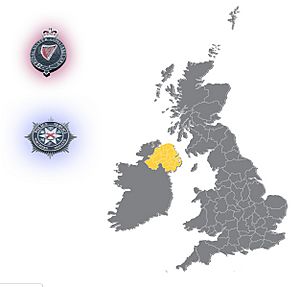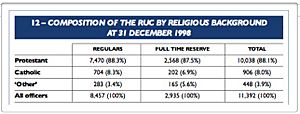Independent Commission on Policing for Northern Ireland facts for kids
The Independent Commission on Policing for Northern Ireland was set up in 1998. It was a big part of the Belfast Agreement, which aimed to bring peace to Northern Ireland. This group was led by a politician named Chris Patten, so it became known as the Patten Commission. In 1999, they wrote a report called the Patten Report. Other members of the Commission included Maurice Hayes, Peter Smith, Kathleen O'Toole, Gerald W. Lynch, Sir John Smith, Lucy Woods, and Professor Clifford Shearing. Bob Peirce was the Secretary and helped write the report.
Contents
Key Recommendations for Policing
On September 9, 1999, the Commission released its report, titled A New Beginning: Policing in Northern Ireland. This report, often called the Patten Report, had 175 ideas for changing the police. Some of the most important ideas were:
- Changing the name of the Royal Ulster Constabulary (RUC) to the Police Service of Northern Ireland.
- Creating a new Policing Board and local District Policing Partnership Boards to make sure the police were accountable.
- Setting up a Police Ombudsman and a Complaints Tribunal to handle complaints.
- Removing most signs of Britishness from the police uniform and buildings.
- Having a 50-50 recruitment policy for Catholics and Protestants joining the police.
- Creating a new set of rules and an oath for officers, focusing strongly on human rights.
- Putting more effort into community policing and making the police service seem more normal.
- Suggesting new ways for training, working with communities, cooperating with other police forces, and hiring people from outside Northern Ireland.
- Asking the Gaelic Athletic Association to remove its Rule 21, which stopped police officers or Army members in Northern Ireland from joining the Association.
How the Report Changed Things
Many of the ideas from the Patten Report were put into action by laws passed in 2000 and 2003. Sinn Féin, a political party, at first refused to support the new police force until all the Patten ideas were fully used. However, in 2007, they decided to support the force and now have members on the Northern Ireland Policing Board.
The report suggested changing the RUC name to "Northern Ireland Police Service," but it was changed to Police Service of Northern Ireland instead. The Gaelic Athletic Association also removed Rule 21, which had banned members of the British army and the Royal Ulster Constabulary from playing Gaelic games. Most of the votes to remove this rule came from the Republic of Ireland. Only one of the six associations in Northern Ireland, County Down, voted to remove it.
Fairness in Hiring and Equality
Affirmative action in Northern Ireland means taking special steps to fix unfairness that certain groups have faced. The goal of equality in a democratic society is to protect and promote real freedom for everyone. It also aims to remove things that stop people from achieving their full potential.
For about 30 years, Northern Ireland experienced a period of conflict known as "The Troubles". This made the differences and suspicions between the Roman Catholic and Protestant communities even stronger. Because of the clear divide between these two main groups, new laws were made to prevent discrimination.
Background of Policing Changes
Policing in Northern Ireland's Past
Efforts to create fairness in the workplace began with the Fair Employment Act (NI) in 1976. This law recognized how important it was for Protestants and Roman Catholics to have equal chances at work. An update in 1989 made it a duty for employers to actively prevent discrimination. Because of these actions, Northern Ireland's way of dealing with unequal opportunities is seen as very different from the rest of the United Kingdom (UK).
The Good Friday Agreement in 1998 aimed to create a "new beginning for policing in Northern Ireland." The goal was to have a police service that everyone in the community could support. A report called the Cameron Report pointed out that incidents involving the Royal Ulster Constabulary (RUC), like the widely seen unrest during the Civil Rights March on October 5, 1968, made many people see the RUC as a Protestant organization. It was clear that any peace agreement in Northern Ireland had to deal with policing issues.
Even though the RUC had its own program to promote fairness, it didn't work very well. For example, the number of Roman Catholics in the police force only went from 7.4% in 1991 to 8.2% seven years later.
The Patten Report's Role

After the conflict, the Independent Commission on Policing, led by Chris Patten, suggested ways to make policing more inclusive. The idea was to create a police force that looked more like the society it served. The police force was immediately renamed the "PSNI" (Police Service of Northern Ireland) to move past the history of discrimination linked to the old police force. The report was a detailed plan that included steps for gender equality, training about community awareness, and changing the overall culture of the police.
A main part of the plan was the 50:50 recruitment rule. This meant that an equal number of Protestant and Catholic candidates would be chosen from those who qualified.
Having a more balanced police force was very important for this temporary rule. It was also expected to produce results quickly. In the bigger picture of Northern Ireland's politics, this rule was connected to the long-term goal of achieving peace. The Patten Report mentioned a survey where over three-quarters of Catholics felt there were too few Catholics in the police, and over 60% of Protestants agreed. The report also recognized that for policing to work well in a democracy, it needs the support of the whole community. It was especially important to make the police force trusted and respected again.
While the Secretary of State mostly accepted the Patten proposals, the temporary 50:50 recruitment rule was not liked by everyone, especially by Unionist political parties. However, this temporary rule became law with the Police (NI) Act 2000.
Looking at the Results
Impact on Northern Ireland Policing
In December 1998, Catholics made up 8.3% of the police service. By March 2011, this number had greatly increased to 29.7%. Owen Paterson called this a "tremendous change." By August 2014, the Catholic proportion had grown to 30.75%.
Catholic confidence in the PSNI has continued to rise. In December 2006, 79% of Catholics had some trust in the PSNI, compared to 75% in September 2005. This is similar to Protestant confidence levels, which have stayed around 80%. However, some critics point out that public trust has fallen in some loyalist and republican communities.
Despite the increase in Catholic representation and support for the police, it has been recognized that the policy has had a negative effect on other communities, especially Protestants. Ian Pearson, a government official, stated that "to date 440 people have been discriminated against" from the Protestant community because of this policy.
Also, Patrick Yu, who leads the Northern Ireland Council for Ethnic Minorities, criticized the 50:50 rule. He pointed out that it only divides people into "Catholics" and "non-Catholics," meaning other minority groups are not included. However, by August 2014, ethnic minorities made up 0.51% of police officers, which is generally in line with the overall population numbers.
Policing in Northern Ireland is still changing. Its effectiveness will continue to be checked by the Policing Board. A report from the Public Accounts Committee found that almost 40% of temporary workers were former police officers, and nearly 20% of officers who retired under the Patten recommendations were rehired as temporary staff. This has led to some criticism that the results of the Patten recommendations might not be as deep as they seem.
Because policing and politics are closely linked, the fairness measures and how well they work will always be reviewed. It's even possible that the improvements in the PSNI's makeup have influenced the Metropolitan Police in London to ask for similar positive action measures to increase the number of ethnic minorities in their force.
See also
- Affirmative Action#United Kingdom
 | William Lucy |
 | Charles Hayes |
 | Cleveland Robinson |



